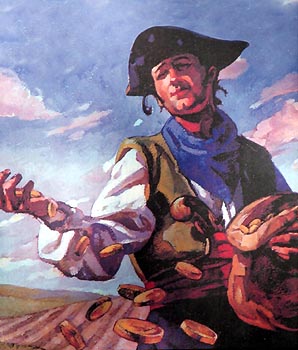 |
 |
|||
|
|
William Davies was a famous highwayman, known as the 'Golden Farmer,' from his habitually paying with gold coin to avoid identification of his plunder. It is said he often left his victims keep their jewels and other valuables. He was born at Wrexham in Denbighshire in 1627, but removed in early life to Sudbury in Gloucestershire, where he married the daughter of a wealthy innkeeper and had, by her, eighteen children. He moved his family to Bagshot on the Surrey-Berkshire border where he became a successful farmer until the last month of his life, but used this trade as a mere cloak. For he had early taken to the road and robbed persons returning from cattle fairs or travelling to pay rent, mainly on Bagshot Heath but also as far afield as Salisbury Plain. He was dexterous in gaining information and his character was above suspicion. Initially operating alone, Davies became a master of disguise and, at one time, robbed his own landlord of the annual rent money just collected from him. He later became the captain and leader of a large gang, among whom was Thomas Sympson, alias 'Old Mobb,' born at Romsey in Hampshire, who robbed for forty-five years with no other companion than the 'Golden Farmer.' Davies robbed the Duchess of Albemarle in her coach on Salisbury Plain, after a single-handed victory over her postilion, coachman and two footmen. He took three diamond rings and a gold watch, besides reproaching her for painting her face and being niggardly. Between Gloucester and Worcester, he robbed Sir Thomas Day of £60, after enticing him into a declaration that the county would make good any money lost on the highway if "betwixt sun and sun". Davies had begun this career as an experiment, after the King's death in 1649, when twenty-two years old. He gained something of a Robin-Hood reputation over the years, with some of his haul finding its way under the doors of local poor families. However, his wife never had any suspicion of his illegal activities and, in all the ordinary relations of life, he was eminently respectable. His charming manners enabled him to secure the fidelity of accomplices and attract the confidence of his victims. The ‘Golden Farmer’ retired from his profession for a few years, but was tempted back to the highway, in hope of making up a large sum for the purchase of land adjacent to his property. He had fallen out of practice and was recognised. Soon afterwards, he was discovered in Salisbury Court in Fleet Street (Westminster) which was, at that time, a kind of sanctuary. He had a narrow escape and shot a pursuing butcher. Being apprehended, he was committed to Newgate Prison, tried for the murder at the Old Bailey Sessions of 11th-17th December 1690 and his previous crimes became known. He was condemned to be hanged at the end of Salisbury Court (instead of Tyburn, as usual), where he had shot the butcher. He died on 22nd December 1690, in the sixty-fourth year of his age, and was afterwards hung in chains on Bagshot Heath. Some say this was adjoining the old pub in Easthampstead that he used to frequent, now the site of a modern replacement known as the ‘Golden Farmer’. He had left affectionate messages for 'Old Mobb,' who was suspected of having betrayed him. Mobb was hanged at Tyburn on Friday 30th May 1691. According to George Daniel of Canonbury, the 'Golden Farmer' had been a corn-chandler in Thames Street, selling by day and despoiling the farmers at night. The contemporary ballad, his 'Last Farewell,' admits his close connection with 'a gang of robbers, notorious hardy highwaymen who did like ruffians reign;' also with housebreakers and burglars, clearing £500. one time, in money and plate. Edited from Leslie Stephen's 'Dictionary of National Biography' (1888)
|
|||
| © Nash Ford Publishing 2005. All Rights Reserved. | ||||



 William
Davies
(1627-1690)
William
Davies
(1627-1690)